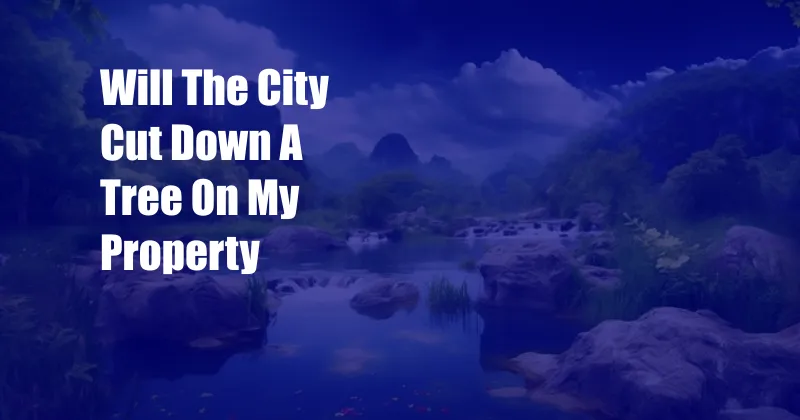
Will the City Cut Down a Tree on My Property?
As a homeowner, you take pride in your property, and the trees on your land are a significant part of its beauty and value. But what happens if the city decides to cut down a tree on your property? Can they do that? The answer is yes, but it depends on the circumstances.
In most cases, the city has the authority to remove trees for safety reasons. If a tree is dead or diseased and poses a hazard to people or property, the city can order it to be removed. The city may also remove trees that are blocking sidewalks or streets.
Tree Preservation Ordinances
Many cities have tree preservation ordinances that protect certain trees from being cut down without a permit. These ordinances typically apply to trees of a certain size or species. If you live in a city with a tree preservation ordinance, you should check to see if your tree is protected.
If your tree is protected by a tree preservation ordinance, you will need to get a permit from the city before you can cut it down. The city will review your request and determine whether or not the tree can be removed. If the city does not approve your request, you will not be able to cut down the tree.
Other Reasons the City May Cut Down a Tree
In addition to safety reasons and tree preservation ordinances, the city may also cut down a tree for other reasons, such as:
- To make way for a new road or other development project
- To improve visibility at an intersection
- To control the spread of disease or pests
If the city plans to cut down a tree on your property, they will typically provide you with notice in advance. You will have an opportunity to object to the removal of the tree and request a hearing. If the city decides to go ahead with the removal, you will be responsible for paying the costs.
Tips for Protecting Your Trees
There are several things you can do to protect your trees from being cut down by the city:
- Make sure your trees are healthy and well-maintained. Dead or diseased trees are more likely to be removed for safety reasons.
- Plant trees in appropriate locations. Avoid planting trees too close to sidewalks, streets, or other structures.
- Learn about the tree preservation ordinance in your city. If your tree is protected by the ordinance, you will need to get a permit before you can cut it down.
Expert Advice
If you are concerned about the possibility of the city cutting down a tree on your property, you should contact a certified arborist. An arborist can assess the health and condition of your trees and provide you with advice on how to protect them.
FAQ
Q: Can the city cut down a tree on my property without my permission?
A: Yes, the city can cut down a tree on your property without your permission if it poses a safety hazard or if it is necessary for a development project.
Q: What are tree preservation ordinances?
A: Tree preservation ordinances are laws that protect certain trees from being cut down without a permit. These ordinances typically apply to trees of a certain size or species.
Q: What should I do if the city plans to cut down a tree on my property?
A: If the city plans to cut down a tree on your property, you will typically receive notice in advance. You have the right to object to the removal of the tree and request a hearing. If the city decides to go ahead with the removal, you will be responsible for paying the costs.
Conclusion
The city has the authority to cut down trees on private property for safety reasons or to make way for development projects. However, many cities have tree preservation ordinances that protect certain trees from being cut down without a permit. If you are concerned about the possibility of the city cutting down a tree on your property, you should contact a certified arborist and learn about the tree preservation ordinance in your city.
Are you interested in learning more about tree preservation?